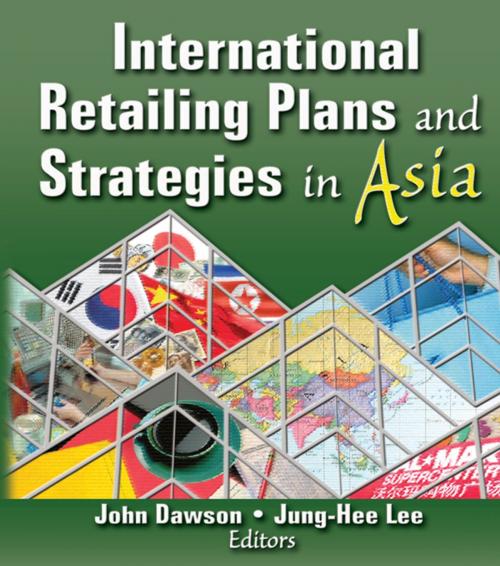International Retailing Plans and Strategies in Asia
Business & Finance, Economics, International, Finance & Investing, Finance| Author: | Erdener Kaynak, Jung-Hee Lee, John Dawson | ISBN: | 9781317954897 |
| Publisher: | Taylor and Francis | Publication: | June 3, 2014 |
| Imprint: | Routledge | Language: | English |
| Author: | Erdener Kaynak, Jung-Hee Lee, John Dawson |
| ISBN: | 9781317954897 |
| Publisher: | Taylor and Francis |
| Publication: | June 3, 2014 |
| Imprint: | Routledge |
| Language: | English |
Learn the how, when, and why of entering Asian markets
Retailers entering Asia are faced with not only a consumer and retail culture very different from their own, but with a variety of cultures that vary greatly among countries within the continent. International Retailing Plans and Strategies in Asia examines the strategies of Western retailers entering into Asian markets and provides specific case examples showing why some companies have failed in Asia-as well as factors that helped others succeed. Important concepts for international retailers exploring Asian markets are clearly explained, and the material is particularly relevant to current WTO and UNCTAD debates about the globalization of retail markets. Helpful tables, charts, and illustrations make complex information easy to access and understand.
International Retailing Plans and Strategies in Asia examines:
-
how foreign investment influences domestic retail systems
-
how strategies for entering European markets can be adapted and applied to various Asian markets
-
the important practice of incorporating local cultural values into trading relationships in Asian markets
-
the investment of Japanese retailers in China and the trend toward internationalization in Asia by Asian retailers
-
the evolution of foreign investment in Korea-with a look at foreign firms’ specific investment strategies
-
issues of local competition and the need for foreign firms to adapt to local consumer cultures, particularly as analyzed in case studies of Metro Cash and Carry, Toys R Us, and Carrefour
-
what understanding foreign markets means in terms of adaptation and success for retailers and wholesalers
The material in these pages will help to inform business decisions about how to (and how not to) enter foreign markets and whether or not it is proper for governments to intervene. The chapters in this book, originally presented as papers at a workshop held at Chung-Ang University in Seoul in November 2003, address issues of diversity in international retailing and distribution in Asia. International Retailing Plans and Strategies in Asia is designed to be essential reading for international marketing students, retail researchers, business managers, and policymakers, and to be a useful addition to university business school library collections.
Learn the how, when, and why of entering Asian markets
Retailers entering Asia are faced with not only a consumer and retail culture very different from their own, but with a variety of cultures that vary greatly among countries within the continent. International Retailing Plans and Strategies in Asia examines the strategies of Western retailers entering into Asian markets and provides specific case examples showing why some companies have failed in Asia-as well as factors that helped others succeed. Important concepts for international retailers exploring Asian markets are clearly explained, and the material is particularly relevant to current WTO and UNCTAD debates about the globalization of retail markets. Helpful tables, charts, and illustrations make complex information easy to access and understand.
International Retailing Plans and Strategies in Asia examines:
-
how foreign investment influences domestic retail systems
-
how strategies for entering European markets can be adapted and applied to various Asian markets
-
the important practice of incorporating local cultural values into trading relationships in Asian markets
-
the investment of Japanese retailers in China and the trend toward internationalization in Asia by Asian retailers
-
the evolution of foreign investment in Korea-with a look at foreign firms’ specific investment strategies
-
issues of local competition and the need for foreign firms to adapt to local consumer cultures, particularly as analyzed in case studies of Metro Cash and Carry, Toys R Us, and Carrefour
-
what understanding foreign markets means in terms of adaptation and success for retailers and wholesalers
The material in these pages will help to inform business decisions about how to (and how not to) enter foreign markets and whether or not it is proper for governments to intervene. The chapters in this book, originally presented as papers at a workshop held at Chung-Ang University in Seoul in November 2003, address issues of diversity in international retailing and distribution in Asia. International Retailing Plans and Strategies in Asia is designed to be essential reading for international marketing students, retail researchers, business managers, and policymakers, and to be a useful addition to university business school library collections.















